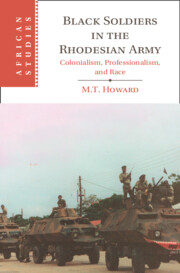Refine search
Actions for selected content:
20 results
Leadership decapitation in civil war: Leadership arrest and the negotiations between the state and the insurgents
-
- Journal:
- Review of International Studies , First View
- Published online by Cambridge University Press:
- 21 July 2025, pp. 1-21
-
- Article
-
- You have access
- Open access
- HTML
- Export citation
Democracy, diversity, and disavowal: Tracing colonial lineages in India’s long wars
-
- Journal:
- Review of International Studies , First View
- Published online by Cambridge University Press:
- 20 June 2025, pp. 1-23
-
- Article
-
- You have access
- Open access
- HTML
- Export citation
2 - The Creation of Black Rhodesian Soldiers’ Regimental Loyalties
-
- Book:
- Black Soldiers in the Rhodesian Army
- Published online:
- 01 February 2024
- Print publication:
- 08 February 2024, pp 51-85
-
- Chapter
- Export citation

Black Soldiers in the Rhodesian Army
- Colonialism, Professionalism, and Race
-
- Published online:
- 01 February 2024
- Print publication:
- 08 February 2024
5 - Hubris and Trepidation (1914–1989)
-
- Book:
- Worlds of Uncertainty
- Published online:
- 21 December 2023
- Print publication:
- 07 December 2023, pp 157-204
-
- Chapter
- Export citation
1 - Baggage
-
- Book:
- Uncivil War
- Published online:
- 03 August 2023
- Print publication:
- 05 October 2023, pp 13-37
-
- Chapter
- Export citation
Toward the Final Curtain: Glimpses of an End Foretold
- Part of
-
- Journal:
- Transactions of the Royal Historical Society / Volume 1 / December 2023
- Published online by Cambridge University Press:
- 07 August 2023, pp. 353-356
- Print publication:
- December 2023
-
- Article
-
- You have access
- Open access
- HTML
- Export citation
3 - Postcolonial Governments and Counter-Insurgency
-
- Book:
- Second-Generation Liberation Wars
- Published online:
- 17 February 2022
- Print publication:
- 24 February 2022, pp 90-138
-
- Chapter
- Export citation
6 - Militancy, Antiterrorism and the Khalistan Movement, 1984–1997
-
- Book:
- Sikh Nationalism
- Published online:
- 19 November 2021
- Print publication:
- 25 November 2021, pp 132-162
-
- Chapter
- Export citation
5 - PKK Insurgency and the City
-
- Book:
- Understanding Insurgency
- Published online:
- 13 August 2021
- Print publication:
- 26 August 2021, pp 146-182
-
- Chapter
- Export citation
‘It's Not Gossip, It's True’: Denunciation and Social Control during the Guatemalan Armed Conflict (1970–85)
-
- Journal:
- Journal of Latin American Studies / Volume 53 / Issue 1 / February 2021
- Published online by Cambridge University Press:
- 06 November 2020, pp. 107-132
- Print publication:
- February 2021
-
- Article
- Export citation
Enter 9/11: Latin America and the Global War on Terror
-
- Journal:
- Journal of Latin American Studies / Volume 52 / Issue 3 / August 2020
- Published online by Cambridge University Press:
- 04 June 2020, pp. 545-573
- Print publication:
- August 2020
-
- Article
-
- You have access
- Open access
- HTML
- Export citation
Part III - The Parochial/Plural Cold War
-
- Book:
- International Law and the Cold War
- Published online:
- 05 December 2019
- Print publication:
- 19 December 2019, pp 337-581
-
- Chapter
- Export citation
19 - The ‘Bihar Famine’ and the Authorisation of the Green Revolution in India: Developmental Futures and Disaster Imaginaries
- from Part III - The Parochial/Plural Cold War
-
-
- Book:
- International Law and the Cold War
- Published online:
- 05 December 2019
- Print publication:
- 19 December 2019, pp 414-446
-
- Chapter
- Export citation
11 - Violence and Suffering within the Government Forces
- from Part IV - Violence and the Government Forces
-
- Book:
- Violence and the Caste War of Yucatán
- Published online:
- 09 August 2019
- Print publication:
- 22 August 2019, pp 104-116
-
- Chapter
- Export citation
6 - The Beginnings
- from Part III - The Caste War and Violence: An Overview
-
- Book:
- Violence and the Caste War of Yucatán
- Published online:
- 09 August 2019
- Print publication:
- 22 August 2019, pp 61-67
-
- Chapter
- Export citation
20 - Caste War Casualties
- from Part VI - Intricacies of Caste War Violence
-
- Book:
- Violence and the Caste War of Yucatán
- Published online:
- 09 August 2019
- Print publication:
- 22 August 2019, pp 269-275
-
- Chapter
- Export citation
Part III - The Caste War and Violence: An Overview
-
- Book:
- Violence and the Caste War of Yucatán
- Published online:
- 09 August 2019
- Print publication:
- 22 August 2019, pp 59-67
-
- Chapter
- Export citation
THE NASTY WAR: ORGANISED VIOLENCE DURING THE ANYA-NYA INSURGENCY IN SOUTH SUDAN, 1963–72
-
- Journal:
- The Journal of African History / Volume 60 / Issue 1 / March 2019
- Published online by Cambridge University Press:
- 20 May 2019, pp. 87-107
-
- Article
- Export citation
Behaviour in war: The place of law, moral inquiry and self-identity
-
- Journal:
- International Review of the Red Cross / Volume 96 / Issue 895-896 / December 2014
- Published online by Cambridge University Press:
- 20 July 2015, pp. 751-773
- Print publication:
- December 2014
-
- Article
- Export citation
